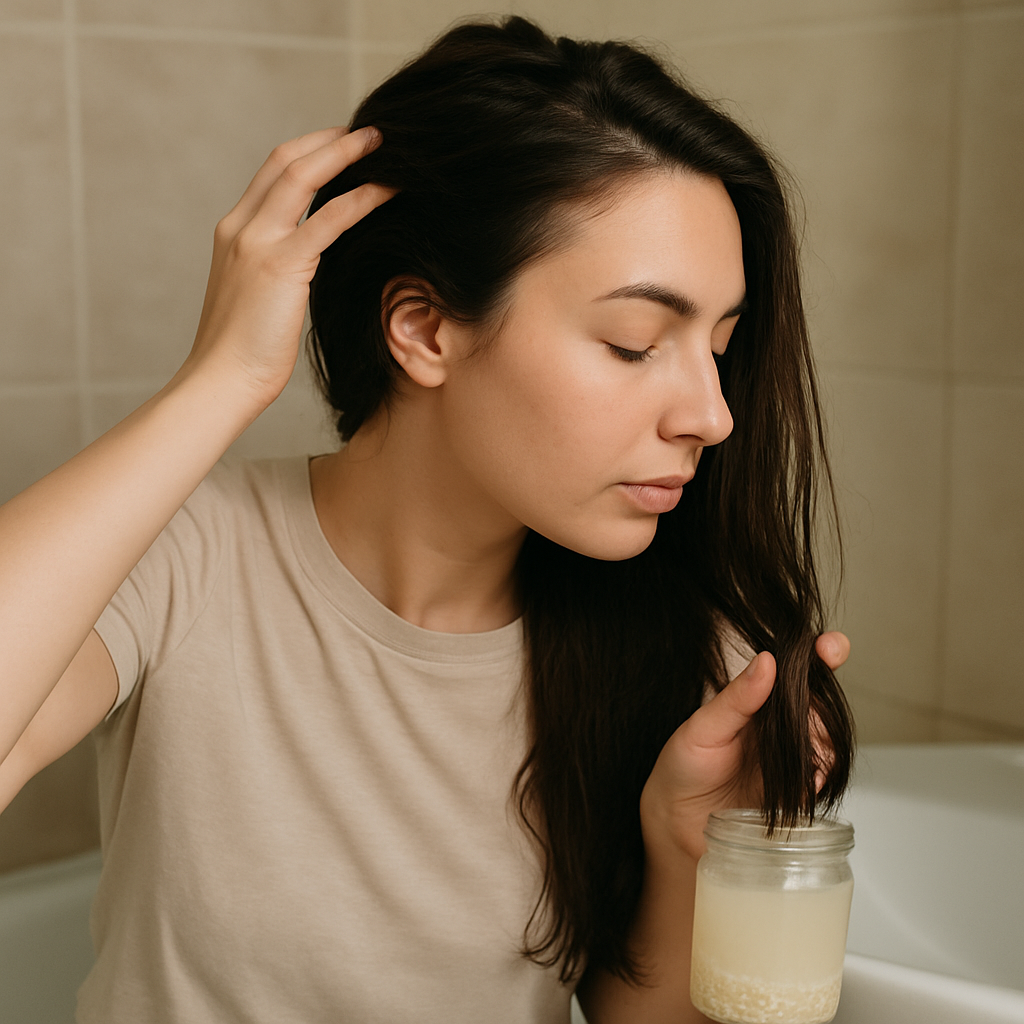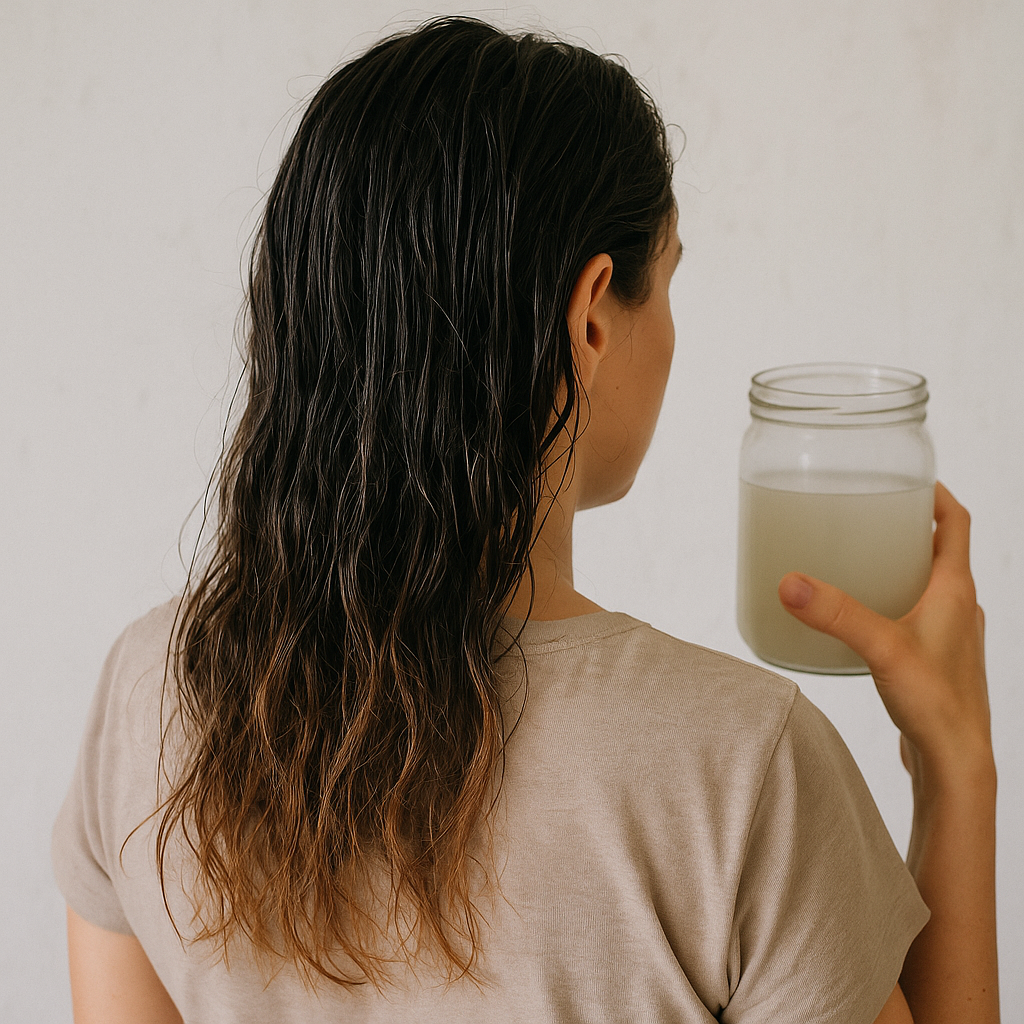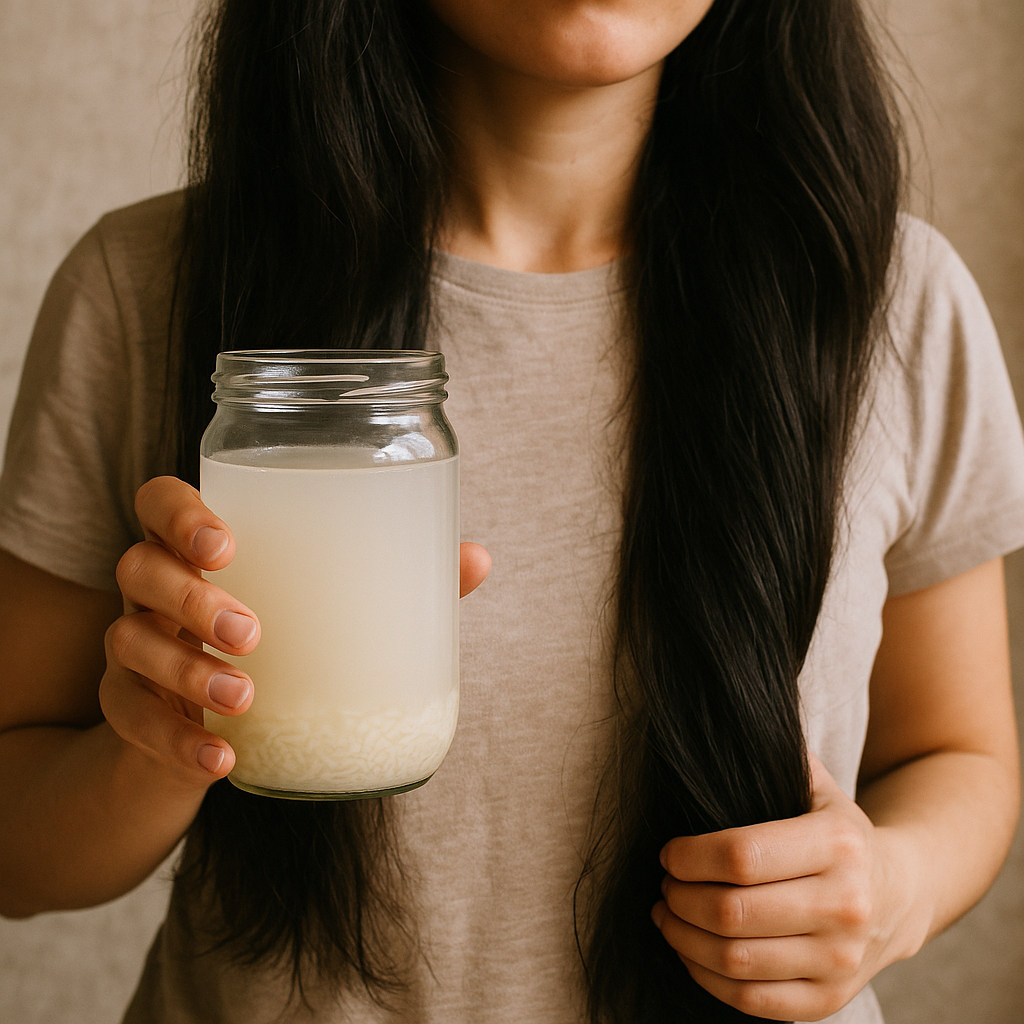Ask Ayurvedic doctor a question and get a consultation online on the problem of your concern in a free or paid mode. More than 2,000 experienced doctors work and wait for your questions on our site and help users to solve their health problems every day.
Can We Use Rice Water Daily on Hair: Benefits and Risks

Rice water has been buzzing all over the internet lately, from beauty blogs to TikTok trends. The question a lot of people are asking is: can we use rice water daily on hair? Some say it’s the secret to long, shiny locks, while others warn of possible damage. Truth is, both sides have a point. If you’ve been wondering is rice water good for hair, how to apply it, or if there are side effects of rice water on hair, this guide will cover everything you need. We’ll look at Ayurvedic traditions, modern methods, and even tricky cases like whether rice water is good for low porosity hair. By the end, you’ll know if this simple kitchen remedy is really worth the hype.

Can We Use Rice Water Daily on Hair: Ayurvedic and Modern Views
Is Rice Water Good for Hair in Daily Use
In Ayurveda, rice water isn’t exactly new—it’s been used for centuries as a natural rinse. Traditionally, people believed it nourishes hair, strengthens roots, and even reduces split ends. From a modern perspective, rice water is rich in amino acids, vitamins B and E, and minerals, which can help improve hair texture and strength.
But here’s the catch: daily use may not be the best idea for everyone. While benefits of rice water on hair are real, overuse might lead to buildup, leaving your hair stiff or dry. So, while the answer to “is rice water good for hair in daily use?” is a cautious yes, moderation really matters.
Benefits of Applying Rice Water on Hair Regularly
The benefits of rice water on hair are often linked to improved elasticity, less frizz, and shinier strands. Some users also report faster growth, though science on that is still limited. Regular use—say two or three times per week—can offer enough nourishment without overwhelming your scalp.
The benefits of applying rice water on hair also extend to scalp health. Fermented rice water, in particular, is said to balance the scalp’s pH and help reduce dandruff. However, if your scalp is sensitive, it’s better to start slow.
Don't wait or self medicate. Start chat with Doctor NOW
How to Use Rice Water for Hair
Traditional Ayurvedic Method of Preparing Rice Water
Ayurveda recommends a simple soak method. You rinse half a cup of rice, soak it in water for 30 minutes to an hour, and then use that water as a final rinse after shampooing. Some households even leave the rice water to ferment overnight, believing it increases potency.
But a quick note: fermented rice water has a stronger smell (not exactly pleasant for everyone). A squeeze of orange peel or a drop of essential oil can help mask it.
Modern Techniques for Applying Rice Water on Hair
Today, people experiment with different approaches. Some use rice water as a spray-on conditioner, while others soak their hair in it for 15–20 minutes before rinsing. You’ll also find DIY masks where rice water is mixed with aloe vera gel or oils.
If you’re thinking of how to use rice water for hair in daily routines, sprays might feel lighter and less sticky than soaking methods. Just don’t forget to rinse occasionally with plain water to avoid buildup.

Side Effects of Rice Water on Hair
Risks of Daily Use of Rice Water
While the benefits of rice water on hair are often praised, daily use can sometimes backfire. The starch and protein in rice water may cause buildup on the scalp, especially if you already use a lot of styling products. This buildup can make hair feel heavy, stiff, or even a little itchy.
Another problem? Over-proteinization. Hair that absorbs too much protein without enough moisture can actually become brittle. It sounds ironic—something that’s supposed to strengthen hair might lead to breakage if overdone. This is why experts often suggest using rice water only two to three times a week rather than daily.
So, if you’ve been wondering “can we use rice water daily on hair”, the short answer is: yes, but it might not be best for long-term health. Think of it more like a weekly hair mask than an everyday shampoo.
Is Rice Water Good for Low Porosity Hair?
This one’s a bit tricky. Is rice water good for low porosity hair? Well, not always. Low porosity hair has tightly packed cuticles, which means it doesn’t absorb products easily. When you apply rice water to low porosity hair, instead of soaking in, it often sits on top and hardens the strands. The result is stiff, straw-like hair that’s hard to manage.
For people with low porosity hair, using rice water sparingly—or diluting it more than usual—may help reduce these side effects. Adding a moisturizing conditioner afterward can also balance things out. So rice water isn’t a total no for low porosity hair, but it’s definitely a “handle with care” situation.

Special Considerations for Hair Types and Conditions
Can We Apply Rice Water on Oily Hair
Another common question: can we apply rice water on oily hair? Yes, you can, but there are some points to keep in mind. Rice water can sometimes make oily scalps greasier if not rinsed out properly. It’s best used as a quick rinse rather than a long soak for people with oily hair.
One hack is to mix rice water with a few drops of lemon juice or tea tree oil. This can help cut down on excess oil while still giving you the benefits of rice water on hair.
Can We Apply Rice Water on Hair After Oil Treatment
In many cultures, applying oil before washing hair is a ritual. So, can we apply rice water on hair after oil treatment? Absolutely. In fact, oiling first can protect your strands from the drying effects of rice water. The rice water rinse then adds strength on top of that moisture base.
Just be sure to rinse thoroughly, otherwise your hair might feel weighed down. A light shampoo afterward can help balance things out if it feels too heavy.
Conclusion
So, can we use rice water daily on hair? The answer depends on your hair type, scalp condition, and how you apply it. While rice water is packed with nutrients that can improve strength, shine, and elasticity, daily use may not be ideal for everyone. Overdoing it can cause buildup, stiffness, or even breakage, especially if you have low porosity hair.
Still, the benefits of rice water on hair shouldn’t be ignored. Used wisely—just a few times per week—it can boost hair health, soothe your scalp, and leave your strands looking more vibrant. Whether you’re preparing it the Ayurvedic way or trying out modern sprays, the key is to experiment and see what works for you.
In the end, rice water is not some miracle cure. But it’s also not just a passing trend. If you’re mindful of side effects of rice water on hair and adjust usage to your needs, it can become a valuable addition to your hair care routine.
So go ahead, give it a try. Start small, listen to your hair, and tweak the process as needed. You might just find yourself recommending this ancient remedy to friends (with a smile that says, “yep, I tried the viral hack and it actually worked!”).
FAQs
How long should I keep rice water on my hair?
Most experts suggest keeping rice water on for 15 to 30 minutes. Leaving it for too long, especially overnight, can cause your hair to feel hard and stiff. For oily hair or sensitive scalps, even 10 minutes is enough. Always rinse with plain water afterward to avoid residue.
Does rice water help with hair fall?
Yes, to some extent. Rice water is rich in amino acids and vitamins that strengthen the roots, which can reduce hair fall caused by breakage. But if your hair loss is due to hormonal changes or medical issues, rice water alone won’t solve the problem. Think of it as supportive care, not a miracle fix.
Is rice water safe for colored hair?
Generally, yes. Can we apply rice water on hair that has been dyed? Absolutely. In fact, rice water’s proteins can help restore strength to chemically treated hair. Just remember not to overuse it, since colored hair often needs extra moisture and rice water can sometimes be drying. Pair it with a hydrating conditioner for best results.
Final Thoughts
Rice water is a fascinating mix of tradition and science. From benefits of applying rice water on hair to exploring whether rice water is good for low porosity hair, it’s clear that this humble ingredient offers both potential and pitfalls. Used mindfully, it can transform your hair routine; used carelessly, it might cause more harm than good.
So, the next time you cook rice, don’t just throw away the water—save it, test it, and see how your hair responds. Share your experience with friends or on social media; who knows, your story might help someone else discover the right way to use it.
👉 Ready to try it? Start with once a week, notice the changes, and adjust from there. Your hair deserves that extra care, and sometimes, the simplest remedies really do shine the brightest.

